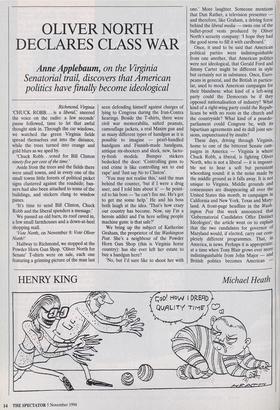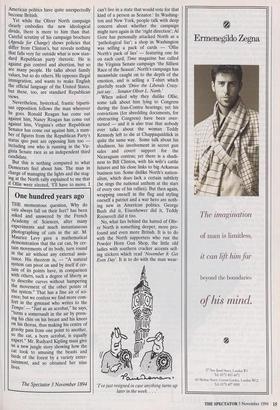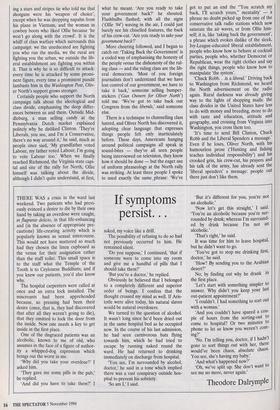OLIVER NORTH DECLARES CLASS WAR
Anne Applebaum, on the Virginia
Senatorial trail, discovers that American politics have finally become ideological
Richmond, Virginia `CHUCK ROBB. . . is a liberal,' sneered the voice on the radio: a few seconds' pause followed, time to let that awful thought sink in. Through the car windows, we watched the green Virginia fields spread themselves out into the distance, while the trees turned into orange and gold blurs as we sped by.
`Chuck Robb. . .voted for Bill Clinton ninety-five per cent of the time.'
Aside from the trees and the fields there were small towns, and in every one of the small towns little forests of political picket signs clustered against the roadside; ban- ners had also been attached to some of the buildings, and stickers clung to window panes.
`It's time to send Bill Clinton, Chuck Robb and the liberal spenders a message.'
We passed an old barn, its roof caved in, a few small farmhouses and a down-at-heel shopping mall.
`Vote North, on November 8: Vote Oliver North!'
Halfway to Richmond, we stopped at the Powder Horn Gun Shop. 'Oliver North for Senate' T-shirts were on sale, each one featuring a grinning picture of the man last seen defending himself against charges of lying to Congress during the Iran-Contra hearings. Beside the T-shirts, there were civil war memorabilia, salted peanuts, camouflage jackets, a real Maxim gun and as many different types of handgun as it is possible to imagine — pearl-handled handguns and Finnish-made handguns, antique six-shooters and sleek, new, facto-
ry-fresh models. Bumper stickers bedecked the door: 'Controlling guns to end crime is like controlling sex to end rape' and 'Just say No to Clinton'.
`You may not realise this,' said the man behind the counter, 'but if I were a drug user, and I told him about it' — he point- ed to his boss — 'he can't fire me. He's got to get me some help.' He and his boss both laugh at the idea. 'That's how crazy our country has become. Now, say I'm a heroin addict and I'm here selling people machine guns: is that safe?'
We bring up the subject of Katherine Graham, the proprietor of the Washington Post. She's a neighbour of the Powder Horn Gun Shop (this is Virginia horse country): has she ever left her estate to buy a handgun here?
'No, but I'd sure like to shoot her with
one.' More laughter. Someone mentions that Dan Rather, a television presenter and therefore, like Graham, a driving force behind the liberal media — owns one of the bullet-proof vests produced by Oliver North's security company: 'I hope they had the good sense to fill it with cardboard.'
Once, it used to be said that American political parties were indistinguishable from one another, that American politics were not ideological, that Gerald Ford and Jimmy Carter might be different in style but certainly not in substance. Once, Euro- peans in general, and the British in particu- lar, used to mock American campaigns for their blandness: what kind of a left-wing party could the Democrats be if they opposed nationalisation of industry? What kind of a right-wing party could the Repub- licans be with no roots in the church and the countryside? What kind of a psuedo- parliament could Congress be, with its bipartisan agreements and its dull joint ses- sions, unpunctuated by insults?
These days, driving through Virginia, home to one of the bitterest Senate cam- paigns in America — Virginia is where Chuck Robb, a liberal, is fighting Oliver North, who is not a liberal — it is impossi- ble not to hear a soft but persistent whooshing sound: it is the noise made by the middle ground as it falls away. It is not unique to Virginia. Middle grounds and consensuses are disappearing all over the United States this month, in campaigns 10 California and New York, Texas and Mary- land. A front-page headline in the Wash- ington Post this week announced that `Gubernatorial Candidates Offer Distinct Ideologies'; the article went on to explain that the two candidates for governor of Maryland would, if elected, carry out com- pletely different programmes. That, ►n America, is news. Perhaps it is appropriate: at a time when Tony Blair grows ever more indistinguishable from John Major — and British politics becomes American —
American politics have quite unexpectedly become British.
Yet while the Oliver North campaign clearly embodies the new ideological divide, there is more to him than that. Careful scrutiny of his campaign brochure (Agenda for Change) shows policies that differ from Clinton's, but reveals nothing that falls very far outside what is now stan- dard Republican party rhetoric. He is against gun control and abortion, but so are many people. He talks about family values, but so do others. He opposes illegal immigration, and wants to make English the official language of the United States, but these, too, are standard Republican views.
Nevertheless, hysterical, frantic biparti- san opposition follows the man wherever he goes. Ronald Reagan has come out against him, Nancy Reagan has come out against him, Virginia's other Republican Senator has come out against him, a num- ber of figures from the Republican Party's status quo past are opposing him too including one who is running in the Vir- ginia Senate race as an independent third candidate.
But this is nothing compared to what Democrats feel about him. The man in charge of managing the lights and the stag- ng at the North rally explained to me that 1 011ie were elected, 'I'll have to move. I can't live in a state that would vote for that kind of a person as Senator.' In Washing- ton and New York, people talk with deep concern about whether the campaign might turn again in the 'right direction'; Al Gore has personally attacked North as a `pathological liar'; a shop in Washington was selling a pack of cards — '011ie North's pack of lies' — featuring one lie on each card; Time magazine has called the Virginia Senate campaign 'the Silliest Race of the Season'. North's campaign has meanwhile caught on to the depth of the emotion, and is selling a T-shirt which gleefully reads 'Drive the Liberals Crazy: just say. . . Senator Oliver L. North.'
When asked why they dislike 011ie, some talk about him lying to Congress during the Iran-Contra hearings; yet his convictions (for shredding documents, for obstructing Congress) have been over- turned — and it is also true that nobody ever talks about the woman Teddy Kennedy left to die at Chappaquiddick in quite the same way. Some talk about his shadiness, his involvement in secret gun sales and covert support for the Nicaraguan contras; yet there is a shadi- ness to Bill Clinton, with his wife's cattle futures and his close links to big Arkansas business too. Some dislike North's nation- alism, which does lack a certain subtlety (he sings the national anthem at the start of every one of his rallies). But then again, wrapping oneself in the flag and styling oneself a patriot and a war hero are noth- ing new in American politics. George Bush did it, Eisenhower did it, Teddy Roosevelt did it too.
No, what lies behind the hatred of Oliv- er North is something deeper, more pro- found and even more British. It is to do with the North supporters who run the Powder Horn Gun Shop, the little old ladies with southern cracker accents sell- ing stickers which read 'November 8: Get Even Day'. It is to do with the man wear- 'I've just resigned in case anything turns up later in the week . . ing a stars and stripes tie who told me that shotguns were his 'weapon of choice', except when he was dropping napalm from his plane in Vietnam, and the woman in cowboy boots who liked 011ie because 'he won't go along with the crowd'. It is the whiff of class warfare which surrounds this campaign: we the uneducated are fighting you who run the media, we the rural are fighting you the urban, we outside the lib- eral establishment are fighting you within it. That is why he is so difficult to attack: every time he is attacked by some promi- nent figure, every time a prominent pundit lambasts him in the Washington Post, Oliv- er North's support grows stronger.
Certainly people who support the North campaign talk about the ideological and class divide, emphasising the deep differ- ences between us and them. Outside Mid- dleburg, a man selling candy at the Pennsylvania Dutch market explained politely why he disliked Clinton. 'They're Liberals, you see, and I'm a Conservative, there's no way around it,' he said, much as people once said, 'My grandfather voted Labour, my father voted Labour, I'm going to vote Labour too.' When we finally reached Richmond, the Virginia state capi- tal and site of the rally for North, 011ie himself was talking about the divide, although I didn't quite understand, at first, what he meant. 'Are you ready to take your government back?' he shouted. Flashbulbs flashed; with all the signs (`011ie '94') waving in the air, I could just barely see his chiselled features, the back of his crew-cut. 'Are you ready to take your government back?'
More cheering followed, and I began to catch on: 'Taking Back the Government' is a coded way of emphasising the honesty of the people versus the dishonesty of the rul- ing class — and the ruling class are the lib- eral democrats. 'Most of you foreign journalists don't understand that we have lost control of our government, we have to take it back,' someone selling bumper- stickers (`Gun Owners for Oliver North') told "me. 'We've got to take back our Congress from the liberals,' said someone else.
There is a technique to channelling class hatred, and Oliver North has discovered it, adopting clear language that expresses things people felt only inarticulately before. These days, Americans hanging around political campaigns all speak in sound-bites — they've all seen people being interviewed on television, they know how it should be done — but the eager use of uniform phraseology at the North rally was striking. At least three people I spoke to used exactly the same, phrase: 'We've got to put an end the "You scratch my back, I'll scratch yours," mentality' — a phrase no doubt picked up from one of the conservative talk radio stations which now saturate the air waves, or from 011ie him- self; it is, like 'taking back the government', a phrase which evokes dislike of the sleek, Ivy-League-educated liberal establishment, people who know how to behave at cocktail parties, people who, whether Democrat or Republican, wear the right clothes and say the right things, people who know how to manipulate 'the system'.
`Chuck Robb. . .is a liberal.' Driving back to Washington from Richmond, we heard the North advertisement on the radio again. Rural darkness was already giving way to the lights of shopping malls: the class divides in the United States have less to do with money and breeding, more to do with taste and education, attitude and geography, and crossing from Virginia into Washington, you cross them too. `It's time to send Bill Clinton, Chuck Robb and the Liberal Spenders a message.' Even if he loses, Oliver North, with his humourless prose Minting and fishing teaches individual responsibility') and his crooked grin, his crew-cut, his prayers and his talk of the army, has already sent the `liberal spenders' a message: people out there just don't like them.












































































 Previous page
Previous page